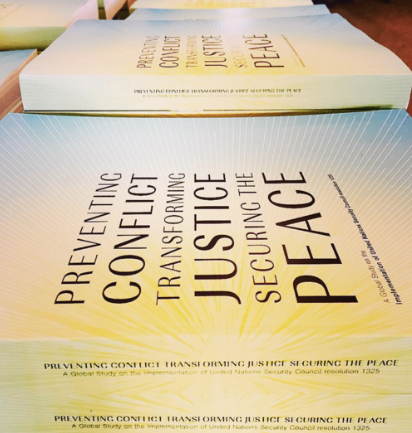#OctoberandBeyond:: How to Get Involved
By: Ghazal Rahmanpanah, Programme Associate

Photo by Ghazal Rahmanpanah, featured hard copies of the Global Study
Today, the Women, Peace and Security Agenda has been successful in changing the political discourse and rhetoric. However, this agenda is continuing to be undermined by the suffocation of civil society space; by attacks on human rights defenders; and by lack of accountability against governments that do not ensure women’s full and effective participation. As Norwegian Secretary of State, Tone Skögen, stated during the Global Study launch, “it’s no longer about counting the women, but making the women count.”
So, what’s next? How do we now strategize after this month of anniversaries and [High-Level] Reviews to truly keep momentum going; to reclaim the WPS Agenda; and to mobilise commitments into action?
Advocacy for Vision
WILPF section, partners, and peace advocates can pursue advocacy by localising existing resources, for one, such as the October 2015 Advocacy Toolkit. Furthermore, we must enforce better information sharing across the board. Sharing best practices across sections and with the PeaceWomen office, for example, can create strong communication channels for greater success!
Monitoring for Accountability
Through monitoring, we can hold our national governments accountable for their commitments to the Women, Peace and Security Agenda and the implementation of UNSCR 1325. Many countries made national and financial commitments to the implementation of the WPS Agenda – and if they were holistic, we must how hold them to it! Let us know how if your country is really mobilizing commitments into action. If your country did not sponsor UNSCR 2242, do not let them present themselves as human rights leaders at the Human Rights Council.
The time is now to demand action; for governments to embrace a truly feminist foreign policy; to radically shift perspectives, policies, and priorities away from militarism and towards sustainable peace; to support an integrated approach to human security and human rights; to do more than just pay lip service to the women fighting for their seat at the table. As Vice Minister Renée Jones-Bos stated in her statement on behalf of The Netherlands during the Open debate, “to quote the late Elvis Presley, Mr. President, the time has come for ‘a little less conversation and a little more action, please’.
WILPF INITIATIVES: 3 - 5 WILPF initiatives or events
NGO Working Group on Women, Peace and Security Open Letter
Launch of the WILPF Peacewomen Scorecard
Peace Forum: Strategic Re-engagements: Advancing Women, Peace and Security and Beyond
Peace forum: People's Action Plans: Empowering Civil Society to Implement 1325
Peace Forum: Transforming Violent Masculinities to Move the Women, Peace and Security Agenda Forward
Peace Forum: Feminist Roadmap for Peace
POLICY BRIEFS/REPORTS: 5 policy reports/briefs (not WILPF’s)
Global Study on Women, Peace and Security
Guidebook on CEDAW General Recommendation No. 30 and the UN Security Council Resolutions on WPS
Peacebuilding Defines our Future Now
Candid Voices from the Field
EXTERNAL INITIATIVES: 5 - 9 resources (include MAP here)
Monthly Action Points on Women, Peace and Security, October 2015
Statement by Ms. Julienne Lusenge at the UN Security Council Open Debate on Women, Peace and Security
Statement by Ms. Yanar Mohammad at the UN Security Council Open Debate on Women, Peace and Security
Statement by Dr. Alaa Murabit at the UN Security Council Open Debate on Women, Peace and Security
Fem Defenders: The Hatred Against Women Human Rights Defenders - Online and Offline
Every Woman Locked Outside Peace Talks is Another Opportunity Lost
Justice on Trial: Lessons from the Minova Rape Case in the DRC
Women Leading Peace
